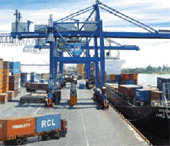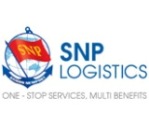 |
Vietnam’s logistics companies are facing a lot of difficulties in the integration period and they need a clear legal framework to develop.
According to the Vietnam Freight Forwarders’ Association (VIFFAS), there are 800-900 operational companies in the logistics industry, including 97 VIFFAS members. These companies have the average operation time of five years and average capital of VND1.5bil ($93,750). All logistics companies prove to be very young and many of them are small scale.
There are four advantages to developing logistics services.
First, the legal framework has been gradually amended to make it suitable to the new conditions of the economy.
Second, full membership in the WTO, ASEAN and the normalisation of trade relations with the US will create the best conditions for the development of many industries and services, including logistics.
Third, Vietnam has a long coastline, has borderlines with China, Laos and Cambodia, which can bring favourable conditions for providing transport services, especially the multi-channel transport, an important factor in logistics service chains.
Fourth, the local labour force proves to be able to meet the requirements for logistics industry development – no need to import labour.
However, companies are facing a lot of difficulties, including their small scales. Privately owned companies now account for 80% of total logistics companies, most of which are very small with the capital of VND300-500mil ($18,750-31,250) for each. Several joint stock companies have been set up on the foundation of equitised parts of state owned enterprises. These newly set up companies have the total capital of VND5bil, or $312,500, with which they cannot meet the requirements for joining the world’s logistics companies.
In fact, many companies have 3-5 staffs only, including managers. With such modest capital and few staffs, the companies just can fulfill simple works for separate clients.
Most Vietnamese logistics companies now do not have overseas representative offices, while logistics are being provided globally.
Nguyen Tham, Deputy Chairman of VIFFAS, said that VIFFAS has been aware of this issue, but admitted that the association still couldn’t fulfill the task of associating its members.
Mr Tham said that there would be a lot of business opportunities in the WTO period. Deputy Minister of Trade Luong Van Tu said that import – export turnover would reach $200bil in the next 10 years. However, it is not certain if opportunities can be grabbed by domestic companies.
Mr Tham said that domestic companies were facing the risk of losing the home market. Only big companies which can provide high-quality services and have a global network can win the tenders for big contracts. Meanwhile, Vietnamese companies are small and do not have wide networks.
Moreover, companies do not have necessary understanding of international laws and the laws of the nations that Vietnam’s logistics services may relate to.
(Source: TBKTVN)
|













